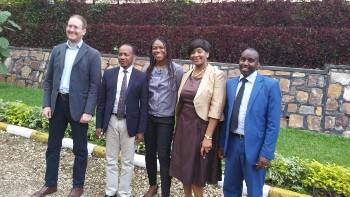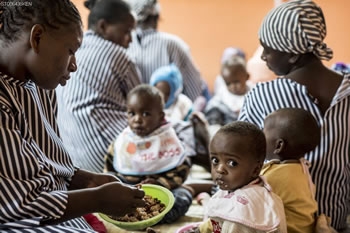Improving the Rule of Law in The Gambia

The Gambia is currently in a transitional period following the democratic election of President Barrow in 2016, ending the Jammeh government which had been in power since 1994. In 2018, The Gambia’s High Commissioner conveyed the importance of the following two years for embedding a trajectory of reform for the country’s justice sector.
A4ID’s ROLE UK Programme has facilitated a peer-to-peer partnership between the Judiciary of England and Wales, and the Judiciary of The Gambia since 2018. Its aim has been to address the current challenges facing the justice sector of The Gambia and, through peer-to-peer training and experience-sharing, to work in collaboration towards tangible and responsive changes.
The Challenges
A major challenge that The Gambia’s justice sector is facing, is the inconsistency in the sentences delivered by magistrates due to a lack of training and guidelines. During A4ID’s scoping visit in June 2018, a trend was identified of a great number of experts trained in the court system leaving to work in the private sector. Another significant challenge identified concerned the functioning of The Gambia’s judicial system: it has as the high number and backlog of appeals. A combination of the automatic right to appeal and a culture of ineffective case management practices, resulted in cases taking far longer to be resolved than seemed just and fair to the appellants seeking justice. Moreover, judges were over-burdened by extremely large caseloads, and the task of processing these cases was worsened by the regular occurrence of power cuts and a lack of material resources. These findings provided clarity in respect of challenges and how they could possibly be addressed by the work of the partnership.
Improving judicial practices in The Gambia through partnerships
Assignment 1
The ROLE UK Programme’s support of this partnership began with a judge of The Gambia’s High Court spending an intensive week at the Commercial Court in London as part of the Standing International Forum of Commercial Courts (SIFoCC) observation programme in September 2018. The trip established peer-to-peer relationships between fellow attending judges from Uganda and Sri Lanka which have endured in the following years through regular communication over ‘WhatsApp’. The Gambian judge is now a member of SIFoCC’s first international working group on case management, co-chaired by the Chief Justice of Australia’s Federal Court and a senior member of the Court of Appeal of England & Wales.
Assignment 2
The partnership’s second assignment consisted of a five-day training programme for all magistrates in The Gambia. This was held in January to February 2019 and delivered by senior judges and representatives from the Commonwealth Magistrates and Judges Association (CMJA). It included training on case management, judicial reasoning and judgment writing. The outcome of this training was not only the sustained and wider-reaching engagement with magistrates and judges in The Gambia, but also the growing public confidence in the judiciary. Moreover, participating magistrates were trained to be coroners, ensuring that they have the skillset required to hear the evidence presented by witnesses and experts involved to competently determine the cause or consequence of somebody’s death.
This training led to the drafting of The Gambia’s first sentencing guidelines on theft, a matter of great importance for the general public. These guidelines were prepared by the Judiciary of The Gambia, and its use is now being supported by the former Chief Coroner from England & Wales who acts as a mentor.
The positive outcomes of The Gambia’s first sentencing guidelines
The outcomes of this ROLE UK Programme-supported training and first sentencing guidelines stretch far beyond the work and lives of the magistrates involved. Having a higher skilled court of first instance will reduce the number of appeals lodged, tackling the backlog and high workload of all judges. Improvements to access to justice through better case management and improved consistency around sentencing will also benefit defendants, the victims, families and the wider community who are affected by the decisions of the courts.
A British judge, Justice Knowles, who delivered pro bono technical expertise as part of the partnership, highlighted the importance of such projects in harnessing critical opportunities to improve the rule of law at moments of political and judicial shake-up, which has been the case in The Gambia. He lauded A4ID for facilitating this expansion of the rule of law; a principle he believes is a “great enabler” of sustainable development, a reality reflected in its inclusion in the UN Sustainable Development Goal 16.
Moving into 2020, the work of the partnership over the previous two years has had ongoing positive impacts. A magistrate who participated in the 2019 training programme affirmed to A4ID that the Judiciary of The Gambia is regularly using the new sentencing guidelines on theft. The magistrate praised the creation of these consistent sentencing guidelines for improving access to justice by ensuring those charged with theft are given proportionate and just sentences. The guidelines are providing greater clarity in the system, speeding up the case processing. During the partnership, work has also expanded to support collaboration between the Judiciary of The Gambia, the Judiciary of England and Wales and UK-based NGO Justice Defenders, to address challenges in the prisons system of The Gambia, particularly the issue of prisoners on remand who are subject to long delays before their cases are heard and lack legal advice to prepare their cases. Recently, the partners involved in this work met online to address the challenges of the Covid-19 pandemic and to plan the upcoming Prison Paralegals Programme, which will train prisoners and prison officers as paralegals to support inmates with bail applications, hearings and appeals.
The partnership facilitated by A4ID’s ROLE UK Programme has proven to be enduring with wide ranging impacts. Cross-national efforts to improve The Gambian’s justice sector and rule of law have been established, ranging from training for magistrates, creation of consistent sentencing guidelines and mentoring relationships established between judiciary peers. This work has been sustained remotely and strives continuously to improve access to justice and the rule of law in line with progressing the achievement of Sustainable Development Goal 16 concerning peace, justice and strong institutions.
In the photo: SIFoCC Judicial Observation Programme participants visiting the Royal Courts of Justice in London, September 2018. (L-R: Hon. Justice Mahinda Samayawardhena, Sri Lanka; Hon. Justice Anna Mugenyi Bitature, Uganda; Hon. Mr Justice Robin Knowles, England & Wales; Hon. Justice Zainab Jawara Alami, The Gambia)
Case study category:

